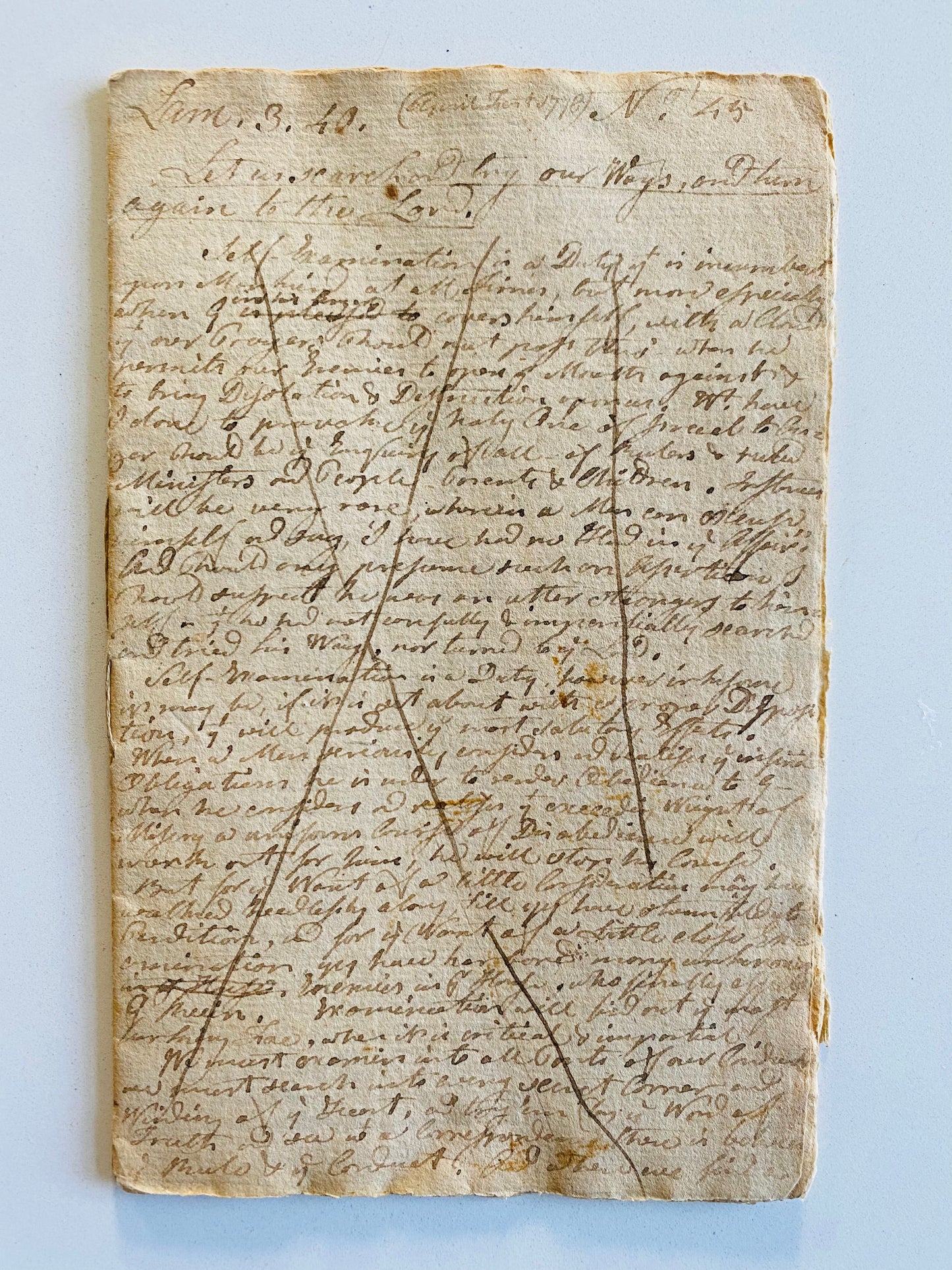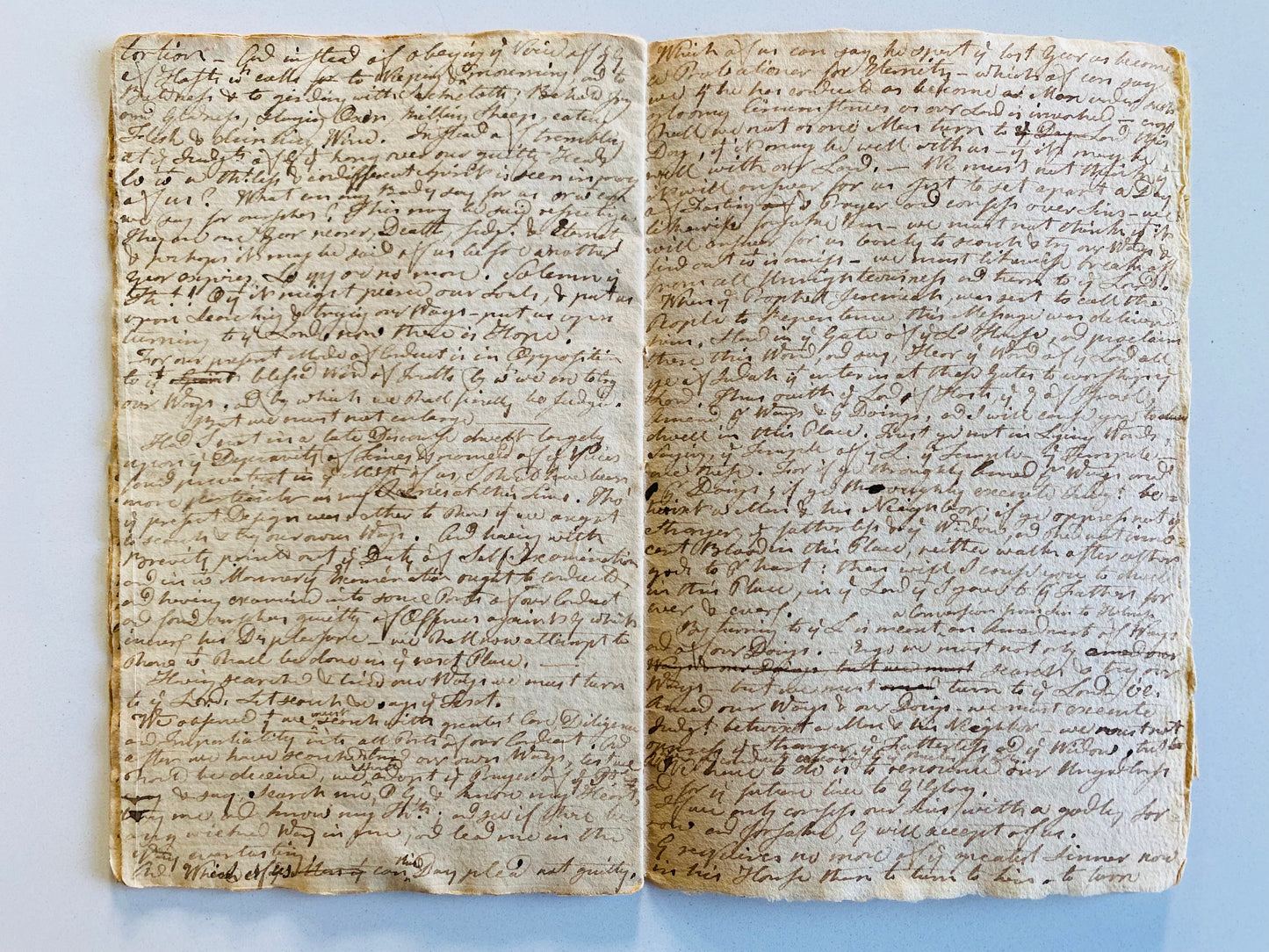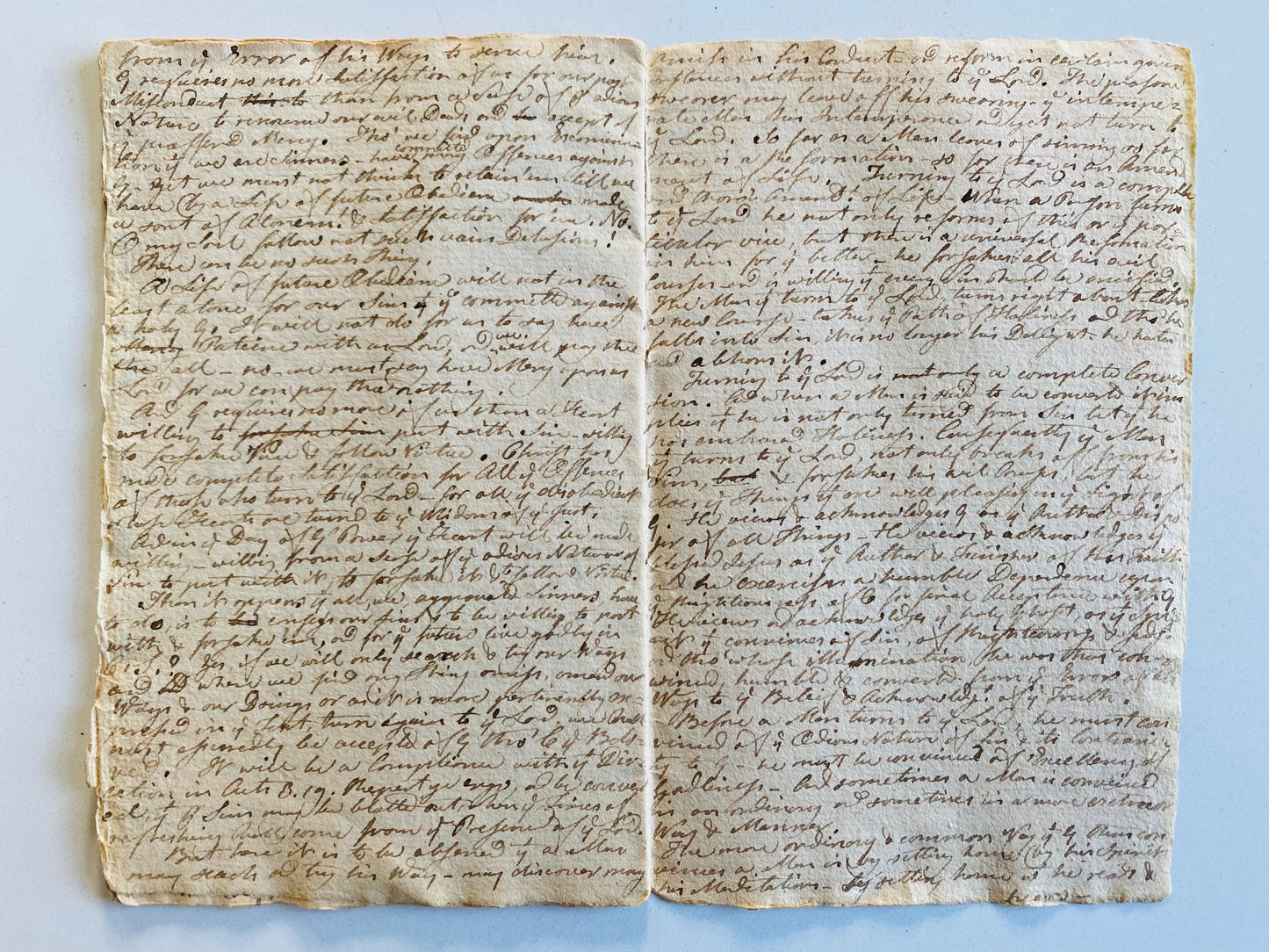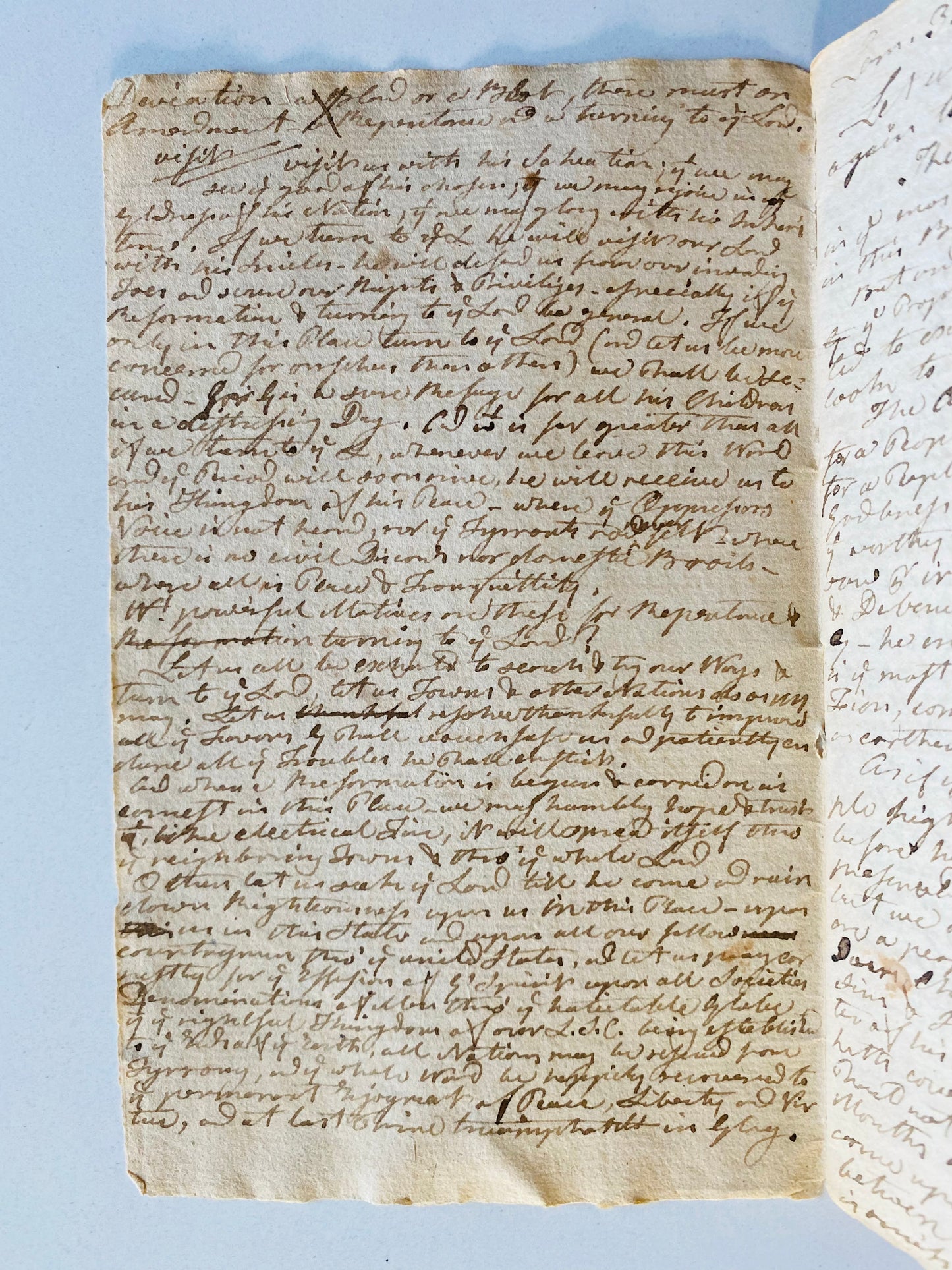Specs Fine Books
1778 ISAAC LEWIS. Unpublished Sermon Preached on a Fast Day After the Sacking of Wilton, CT by British Troops
1778 ISAAC LEWIS. Unpublished Sermon Preached on a Fast Day After the Sacking of Wilton, CT by British Troops
Couldn't load pickup availability
A wonderful, unpublished piece of Americana with direct reference to the earliest stages of the American Revolution. In 1777, a brutal sacking of Wilton, Connecticut, where the present was preached, led to the preaching of a particularly fiery Annual Fast Sermon by their pastor, Isaac Lewis [1746-1840]. The following year, April 1, 1778, the Annual Fast approached again. And Lewis was deeply concerned that his people would forsake the duty of self-examination in favor of criticizing their enemy, the British. In keeping the theme of the Fast Sermon, present here in manuscript, he closely applied the text to his people, exhorting them to examine their own sin, not Britain's, not other States' or towns', but their own. Then and only then would there be an "effusion of the Spirit," a term for revival popularized by Joseph Sewall and Jonathan Edwards. Then God would protect them, heal them, and ultimately restore peace to Wilton, Connecticut, the United States, and the World.
It should be noted how closely Lewis ties together piety, revival, and national security, prosperity, and influence. The "New Israel" ideas of Ezra Styles and others are alive and well in Lewis' sermon.
Lewis was a revivalist. Graduating from Yale in 1765, he had the blood of Edwards, the Tennent, and Whitefield in his veins. This was most evident in his attempts to rid Wilton of the half-way Covenant, by which the nominal but unconverted were allowed to participate fully in the life of the Church. Many churches had done away with this during the Great Awakening. Wilton was a hold out. They ultimately relieved him of his duty because of the issue. He then pastored in Greenwich, CT for 32 more years before being succeeded by his son and passing away at 94 years of age.
His ingracious dismissal was not before he suffered with Wilton during the war, serving in the army, and suffering poverty during the inflation and insecurity of the Revolution and the additional challenges of pastoring of a community pillaged by the British Army.
Extracts:
April 1, 1778. No.45
Lamentations 3.40. Let us search and try our ways and turn again to the Lord.
Self-examination is a Duty yt is incumbent upon Mankind at all times, but especially now when Gd comes himself, with a cloud, that our prayers should not pass thus, when he permits our enemies to open tr mouths against, & to bring desolation & destruction upon us. What have I done to provoke ye holy one of Israel to anger should be the Enquiry of all - of Rulers & Ruled - Ministers & People - Parents & Children. Instances will be very rare wherein a man can assess himself and say, I have had no hand in ye affair. And should any presume such an assertion I would suspect he was an utter stranger to himself & he had not carefully & impartially searched & tried his ways, nor turned to ye Lord.
Self-examination is a Duty, however ***** yo may be, if it is set about with a proper disposition, yt will produce ye most salutary effects.
When a men seriously considers & realizes ye ***** Obligations he is under to render Obedience to G- when he considers and realizes ye exceeding weight of Misery and uniform Curses all Disobedience will work out for him, he will stop his Course. But for ye want of a little Consideration many have walked heedlessly along till yy have stumbled into perdition, and for ye want of a little close self-examination, yy have harbored many unknowing Enemies of G House who finally effect O ruin. Examination will find out ye most lurking foe when it is critical and impartial.
We must examine into all Parts of our Conduct and must search into every secret Corner and Winding of ye Heart, and try tm by ye Word of Truth & see wt Correspondence there is between ye Rules & ye Conduct. And if there we find a deviation or a blot, there must be Amendment - a Repentance and a turning to ye Lord.
Visit// Visit us with his Salvation; yt we may **** of his Nation; yt we may glory with his inheritance. If we turn to ye L He will visit our Land with his Smiles - he will defend us from our invading Foes and secure our Rights & Privileges - especially if ye Reformation & turning to ye Lord be general. If we only in this place turn to ye Lord (and let us be more concerned for ourselves than others) we shall be secured - for G is a sure Refuge for all his Children in a Distressing Day. And wt is greater than all if we turn to ye L, whenever we leave this World and ye Period will soon arrive, he will receive us to his Kingdom of his Peace - when ye Oppressors Voice is not heard, nor ye Tyrants rod felt - where there is no evil Discord nor Domestic broils - where all is Peace & Tranquility.
Wt powerful motives are these for Repentance & Reformation; turning to ye Lord?
Let us all be exhorted to search & try our Ways, & turn to ye Lord, let other Towns & other Nations do as ty may. Let us rejoice thankfully to improve all ye favors G shall ****** us and patiently endure all ye Troubles he shall inflict.
And whence Reformation is begun & carried on in earnest in this Place - we may humbly hope & trust ye N [sic. Reformation] will spread itself to this ye neighboring towns & this ye whole Land.
O then let us seek ye Lord till he come and rain down Righteousness upon us in this Place - upon us in this State and upon all our fellow countrymen thro ye united States, and let us pray earnestly for ye effusion of Gs Spirit upon all Societies & Denominations of men thro ye habitable Globe yt ye rightful Kingdom of our L.J.C. being established to ye Ends of ye Earth, all Nations may be rescued from Tyranny and ye whole World be recovered to ye permanent Enjoyment of Peace, Liberty, & Virtue, and at last to rise triumphant in Glory.
Lam. 3.40
Let us Search & try our Ways and and turn again to the Lord.
The pitiful case of Jerusalem is painted in ye most striking Point of Light by ye Prophet in this Book of Lamentations.
But under all ye severe Judgts yt befell ye Jews ye Prophet justifies G, and calls upon ye Afflicted to exercise Patience and Resignation and to look to G for Comfort, Support, & Relief.
The Advice in our Text was very pertinent for a People who were once distinguished for piety & Godliness, but were then greatly degenerated from ye worthy Character ty once attained. When he saw tr irreligion, yr profanity, yr intemperance & debauchery, yr betrayal of G and ye People of G - he cries out, How is ye Gold become dim! How is ye most fine G changed? The precious Sons of Zion, comparable to fine God, how are yy esteemed as earthen pitchers?
As if ye Prophet had said we were once a People highly favored of G and while we walked before him with Integrity and Uprightness, he preserved us - defended us from our Foes and ye like, but we are now become a backslidden people - we are a people laden with Iniquity, a Land of evil, Dark Children, yt ore corrupted, and for these our Sins & Iniquities, see how G has covered ye Daughter of his Zion as with a Cloud yt our Prayers should not reach him - our Enemies have opened yr mouths against us & Desolation & Destruction is come upon us - it is our Sins yt have separated between our G & us, Let us examine & see wt is amiss - Let us search & try our ways.
And this Advice is not less pertinent for us in this Land who were once a pious godly People, but are now justly characterized with almost every Vice yt can be named. While we walked with G we were highly favored of him. Look back and see how he hath defended & protected us - how he hath multiplied & increased us - but since we departed from him - since we have forsaken him, it has fared ill with us. He hath permitted our Enemies to open yr mouths against us - he hath sent Desolation & Destruction upon us. Ergo let us examine & see wt is amiss - let us search and try our Ways & turn again to ye Lord.
Self-examination is a Duty incumbent upon Mankind at all times, but more especially wn G is contending with us, and brings his heavy Judgt upon us. Wt have I done thus to provoke the Holy One of Israel to Anger should be the Inquiry of all - of Rules & Ruled, Ministers and People, Parents & Children. Instances will be very rare wherein a man can examine himself & say, "I have had no hand in ye affair." If a man should presume such an Aspiration, I should suspect if he was an utter stranger to himself - if he had not carefully & impartially examined into his conduct yt he had not searched & tried his Ways.
I hope none of us shall attempt to excuse ourselves - such aggravated Sinners are we all. Do you know of greater sinner than you in yourself - I don't know of a greater sinner than I am myself, noting my fair pretenses to Religion. G be merciful to us Sinners! - But to proceed.
Self-examination is a Duty, however in wc our N[ation] may be, if it is set about with a proper Disposition, yt will produce ye most salutary Effects. But for ye want of a little Consideration, many have walked heedlessly along till ye have stumbled into Perdition and others for ye want of a little close Examination have harbored many unknown enemies in ye House, who finally effected yr ruin.
Examination, where it is critical & impartial will found out ye most lurking Foe.
But ye must examine into all Parts of our Conduct, into ye most secret corners & windings of yr Heart, and try ourselves by ye Word of Truth and see wt a Correspondence is between ye Rule & ye Conduct. And where we find ye least Deviation, wr we discover a **** or a blot, there must be an Amendment - there must be Repentance and a Returning to ye Lord with full Purpose of & sincere Endeavor after new Obedience.
We should daily examine ourselves & see whether we are in ye Faith - examine & see how our conduct corresponds with ye Rules of Christianity.
Especially does it become us on or antecedent to a solemn Day of Fasting, to examine ourselves, search and try our ways, for thus we endeavor, from a principle of ingenuous sorrow for sin, to confess before G our Offences. And how shall we know wt is amiss in us unless we search & try our Ways. Shall we not be apt to utter some things rashly, unless we examine ourselves At least there will be Danger.
Self-examination is [a] Duty yt may be evinced from many Passages of Scripture, so from our Text we shall not at present produce any other Evidence. Let us search& try our Ways says ye Prophet. It is our duty to do so.
Here it is observable yt when we are going to examine ourselves either to see wt is amiss, or to see wt Grounds of Hope we have of being interested in ye special Favors of G, a careless indifferent Look with ye Eye will not answer. No. We must not only look into our conduct, but we must search, make an actual Examination. Let us search & try our ways, says ye Prophet.
And when we are going to set about this Work of Examination, we should endeavor to realize ye Necessity & Importance of it, & make this previous Resolution . . . yt if we loved any thing amiss, would we [slay] it. It is in vain for us to examine ourselves if we are determined to persist in our Evil Course.
Unless we make this previous Resolution with ourselves, wherein I find I have done iniquity by ye Grace of G I will do so no more, Examination will not be likely to produce any salutary Effects. So when we confess our sins before G we should resolve to forsake them, otherwise we only mock G and cannot expect yt he will express his merciful kindness toward us. He yt confesseth and forsaketh shall obtain Mercy. Again
Having formed a Resolution to forsake our evil Courses, to rectify wt is amiss upon detecting our Vices, we should set about ye work of examination with a Resolution likewise to go thro, tho ever so painful and disagreeable.
When we are going to examine into our Conduct we must search with ye greatest Care. Diligence and Impartiality into all its parts, and having accomplished a diligent search - having serached & examined all parts of our Conduct, we must try it and see whether it is good or bad - and we must try it not by comparing it with other mens conduct, thinking yt if it agrees with theirs it will answer well enough, . . . neither must we depend upon Reason to determine ye Propriety or Impropriety of our Conduct, for yt is often misguided, no we must bring it to Ye touch Stone - we must lay it by ye Word of G and see whether it agrees with Ye rules there pointed out, and if we find by a thoro & impartial examination yt ye Motives and Views of our Conduct are such as ye Word of G points out, we shall have great Matter of joy & rejoicing - we shall have great Reason to bless G for his restraining, aiding & resisting Grace. But if when we come to try our Ways we compared our Conduct with ye Word of God, and find yt we have gone counter to those Rules, gone counter to our own Promises & Vows & Resolutions - if we find yt we have not conducted as we might to have conducted under such & such circumstances - if we find we have been careless & negligent - if we find we have offended in many Things or only in one Point, we must turn to ye Lord - we must with ye deepest Contrition of soul confess before him our sins with a full Determination to forsake them, humbling imploring forgiveness thro ye Blood of ye great Atonement.
And if we confess our sins with proper Temper & Disposition of mind, G is faithful & just to forgive us our sins & to cleanse us from all [Un]righteousness.
And have thus searched & tried our ways and turnd to ye Lord, we shall be fit to live of fit to die. If we turn to Ye Lord whom he hath smitten, he will heal us and he will bind us up.
Allowing these things to be true, what if we should spend a few minutes in examining ourselves.
Thro ye Hand of a Kind Providence we are brought to see another Annual Fast. . . .
Perhaps it would be more agreeable to some to hear a Dissertation upon ye Vices of Britain - but we have no need to go to Britain for Vices. Alas! We have enough & too many in our Towns to search & try ye Ways of others, for this there are Vices enough in Wilton.
You & I have no need to search & try ye Way of our Neighbor, for we have Vices enough in our Hearts. We are very apt to search & try ye way of others, but neglect to search & try our own Way. We are fond yt others should turn to ye Lord, yt it may fair well with us & our Lord upon Or account, but we choose to neglect turning to ye Lord till a more convenient Season.
But this is wrong. Reformation should begin at Home. We should never attempt to removed ye mote out of our Neighbors Eye till we first pulled ye beam out of our own Eye. We should search & try our own Way & not ye Way of another man, and if we find yt we are without sin, yn we may with safety throw ye stone at our Neighbor. When we have searched & tried our Ways & turned to ye Lord ourselves, then it will be full soon enough for us to search & try the ways of others. So when Wilton is reformed we may with a better Face endeavor ye Reformation of other Towns. So when we in this Land have all become pious & godly, when we have turned to ye Lord, it will become us then better than it does now to talk about ye Vices and Declensions of Britain.
. . . ye we have misimproved and abused Gs Favors - when he had been pleased to smile upon public affairs & to protect us & [give] unexpected conquests by Sea & Land, we have not given him ye Honor & Glory yt was due to his name, did not ascribe ye Victory to him, but to our own Bow!
Wt secret corner can witness for us wn we have sighed & cried for ye abominations committed in the midst of us. What secret corner can witness for us yt we have with deep contrition of soul confessed before G our own Sins & ye sins of others yt have brought down such heavy Judgt upon our growing Land. And yt we have with earnest supplication besought G to pour out his Spirit and revive his Works and visit his Land with Favor and defend ye Vine wc his own right hand hath planted? Do not we find upon examination yt our hearts have been as Iron & Brass?"
Etc. etc. etc.
The manuscript is entirely legible in 20pp; it appears to have been begun on page one, then begun again on page three. It is also ends abruptly at the end page page 20 after a series of applications. There are no missing pages from the gather, which would have been sewn to purpose, so we gather [no pun intended] that he simply left room for a short impromptu exhortation at the end as he had run out of paper. It reads as complete other than a simple concluding exhortation or thought.
One small corner lacking affecting just a few words, but nothing of the sense.
Share








